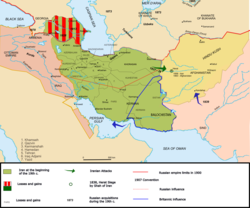Qajar dynasty
Iranian royal dynasty
The Qajar dynasty (Azerbaijani: Qacarlar) (Persian: سلسله قاجار), was an Iranian dynasty[Note 1] that originated from the Turkic[2] Qajar tribe. It ruled Iran from 1789 to 1925.
Sublime State of Iran دولت علیّه ایران | |||||||||||
|---|---|---|---|---|---|---|---|---|---|---|---|
| 1789–1925 | |||||||||||
| Anthem: (1873–1909) Salâm-e Shâh (Royal salute) (1909–1925) Salâmati-ye Dowlat-e 'Aliyye-ye Irân (Salute of the Sublime State of Iran) | |||||||||||
 Map of Sublime State of Iran in the 19th century. | |||||||||||
| Capital | Astarabad (1779–1789) Tehran (1789–1925) | ||||||||||
| Government | Absolute monarchy | ||||||||||
| Shah | |||||||||||
• 1789–1797 (first) | Mohammad Khan Qajar | ||||||||||
• 1909–1925 (last) | Ahmad Shah Qajar | ||||||||||
| History | |||||||||||
• Established | 1789 | ||||||||||
• Disestablished | 1925 | ||||||||||
| |||||||||||
Qajar Shahs of Iran
| Name | Portrait | Title | Reign years | |
|---|---|---|---|---|
| 1 | Agha Mohammad Khan Qajar |  | Shah, Khan | 1789–1797 |
| 2 | Fath-Ali Shah Qajar |  | Shahanshah, Khaqan | 1797–1834 |
| 3 | Mohammad Shah Qajar |  | Shahanshah, Ghazi, Khaqan son of Khaqan | 1834–1848 |
| 4 | Naser al-Din Shah Qajar |  | Shah, Zell'ollah, Qebleh-ye 'ālam, Islampanah | 1848–1896 |
| 5 | Mozaffar ad-Din Shah Qajar |  | Shahanshah, Sultan | 1896–1907 |
| 6 | Mohammad Ali Shah Qajar |  | Shah | 1907– 1909 |
| 7 | Ahmad Shah Qajar |  | Shah | 1909–1925 |
References
Sources
- Amanat, Abbas (1997). Pivot of the Universe: Nasir Al-Din Shah Qajar and the Iranian Monarchy, 1831-1896. University of California Press. pp. 2. ISBN 978-0-520-08321-9.
In the 126 years between the fall of the Safavid state in 1722 and the accession of Nasir al-Din Shah, the Qajars evolved from a shepherd-warrior tribe with strongholds in northern Iran into a Persian dynasty with all the trappings of a Perso-Islamic monarchy.
- Yarshater, Ehsan (2004). "IRAN ii. IRANIAN HISTORY (2) Islamic period". Encyclopædia Iranica. Vol. XIII, Fasc. 3. p. 238–241.
The Qajar were a Turkmen tribe who first settled during the Mongol period in the vicinity of Armenia and were among the seven Qezelbāš tribes that supported the Safavids.
Notes
🔥 Top keywords: Main PageSpecial:Search0Slash (punctuation)BlackSpecial:RecentChanges4 (number)DavidSOLID (object-oriented design)Wikipedia:AboutFile:Sexual intercourse with internal ejaculation.webmHelp:ContentsHelp:IntroductionLisa Sparxxx2023 UEFA Champions League FinalColour24-hour clockAdolf Hitler UunonaBismillahir Rahmanir Raheem6 (number)T. N. SeshanFile:ASCII-Table-wide.svg20 (number)Poor Things (movie)United StatesCristiano RonaldoList of people who have walked on the MoonAli Malikov50 (number)17 (number)The Valley (2024 TV series)GrassList of mathematical symbolsList of U.S. states and territories by time zone8 (number)List of countries by areaWikipedia:Simple talkList of largest Hindu templesRama

